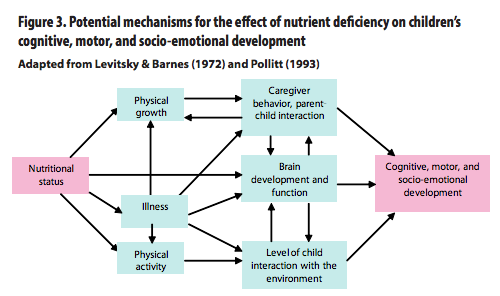Alive & Thrive published a report in January of 2012 suggesting that malnutrition affects brain development not just directly, but also indirectly as the conditions work to shape the child’s experiences. While nutrient deficiencies physically affect the development of the brain, the child’s daily experience may be altered by subsequent behavioral manifestations. Alive & Thrive asserts that undernourished children may exhibit characteristics, such as frequent illness, irritability and withdrawing that could lead caregivers to react more negatively toward them. Essentially, behaviors caused by malnutrition may be undermining the establishment of securely attached relationships that have become indicative of strong socio-emotional skills later in life.
Alive & Thrive estimates that there are 200 million children globally failing to reach their developmental potential partially due to undernutrition. While many studies of malnutrition focus on the extreme end of the spectrum, it is important to remember that proper nutrition is a balancing act every individual must learn how to manage.
The chart below illustrates how “interventions aimed at either the child or the caregiver may have cumulative and cascading effects over time” (p. 3). The critical nature of the dyadic relationship between child and caregiver makes the potential interruption of attachment devastating.
Reference
Prado, E. & Dewey, K. (2012). Insight: Nutrition and brain development in early life (A&T Technical Brief Issue 4). Retrieved from http://www.aliveandthrive.org/sites/default/files/file-attachments/Technical%20Brief%204-%20Nutrition%20and%20brain%20development%20in%20early%20life.pdf.
